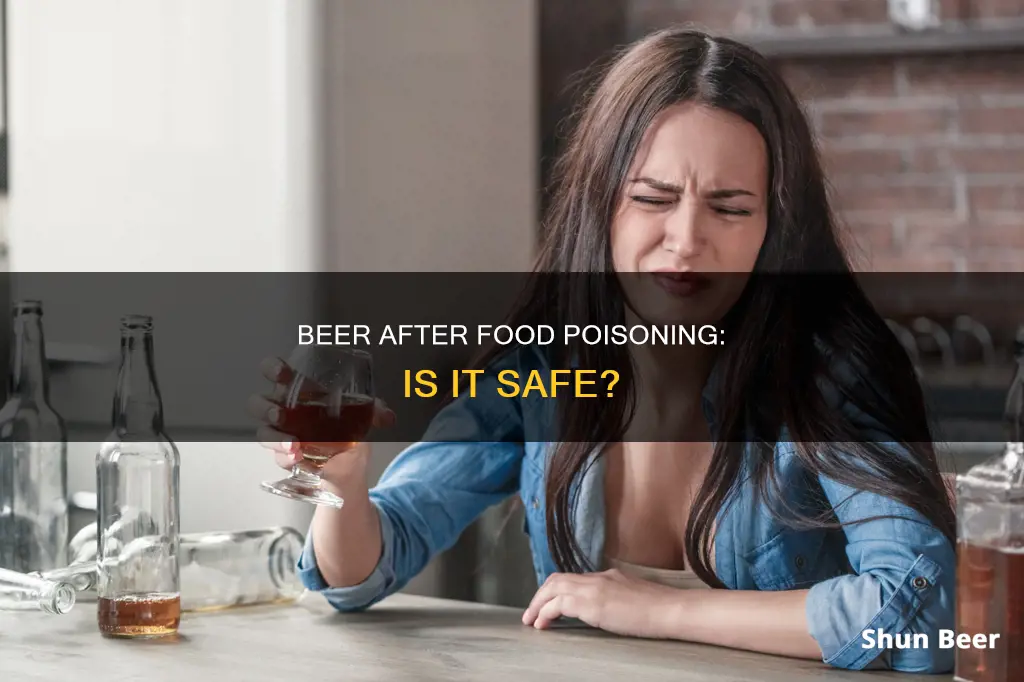
Drinking alcohol with a meal can lower the risk of food poisoning, according to some sources. However, if you are recovering from food poisoning, it is best to avoid alcohol as it can be tough on the stomach and make nausea worse. Instead, it is recommended to consume bland, low-fat, and low-fiber foods that are gentle on the stomach, such as crackers, toast, and oatmeal.
What You'll Learn

Beer may reduce the severity of food poisoning
While beer is not the best option to reach for when you're recovering from food poisoning, some studies suggest that alcohol may reduce the severity of food poisoning.
Food poisoning is relatively common, and it can be caused by contaminated food or drinking water. The first step to recovery is to let your stomach settle by avoiding food and drink altogether for a few hours. Once you're feeling up to it, it's important to focus on rehydration, as vomiting and diarrhea can cause dehydration. Sports drinks, sodas, and chicken or vegetable broth can help with this. When you're ready to eat, stick to bland, low-fat, low-fiber foods like crackers, toast, and oatmeal, as these are easy on the digestive system.
Although it's best to avoid alcohol when you're actively ill, some studies suggest that drinking alcohol with a meal can lower the risk of food poisoning or reduce its effects. For example, a 2002 study in Spain found that the rate of sickness was lowest among those who had consumed large amounts of beer, wine, or spirits during a salmonella outbreak. Similarly, a 1992 study in the US found that drinks with an alcohol concentration of 10% or greater prevented or reduced the severity of sickness during an oyster-borne outbreak of hepatitis A. Alcohol's protective effect may be due to its ability to stimulate gastric acid secretions in the stomach, and wine's antibacterial properties may also play a role.
However, it's important to note that alcohol can be tough on the stomach and can make nausea worse, especially if you're already dehydrated. Therefore, it's generally recommended to avoid alcohol and focus on rehydration and gentle, easily digestible foods when recovering from food poisoning.
Beer and Metoprolol: What You Need to Know
You may want to see also

Beer is dehydrating
Drinking beer after food poisoning is not recommended, as alcohol is not easy on the stomach and can make nausea worse. It is important to let your stomach settle after food poisoning, and drinking alcohol can cause dehydration, which is a risk after food poisoning due to vomiting and diarrhea.
Beer is a diuretic, which means it will make you urinate more. This is because alcohol suppresses the production of the anti-diuretic hormone (ADH), which is responsible for maintaining sodium balance in the body. With less ADH, your kidneys will create more urine. This can increase the risk of dehydration, as you will lose fluids.
The higher the alcohol content of the beer, the more your body will have to work to filter it out. Alcohol stays in the body longer than water, and it can take up to six hours for alcohol to leave your system. This means that drinking beer can leave you feeling thirsty, as your body craves more fluids to replace what has been lost.
In addition to increasing urination, drinking beer can also offset electrolyte levels. Electrolytes, such as sodium, are important for retaining ingested fluids and restoring lost plasma volume. However, the amount of sodium in beer is too low to have a significant effect on fluid retention.
To prevent dehydration, it is recommended to drink water along with beer. This will help to replace the fluids lost through urination and keep your body hydrated.
Beer and Weight Loss: Is It Possible?
You may want to see also

Beer is not easy on the stomach
Drinking alcohol with a meal can lower the risk of food poisoning. However, it is important to be cautious when consuming alcohol, especially if you have a sensitive stomach. Beer is not always easy on the stomach, and it can cause discomfort and even worsen nausea. Here are some reasons why beer may not be the best choice for those with stomach issues:
High Carbonation
Beer is highly carbonated, and the release of carbon dioxide gas in the body can cause bloating and gas. This can be particularly uncomfortable for those with digestive disorders or sensitivities. The carbonation can also contribute to burping and a feeling of fullness.
FODMAP Content
Beer contains FODMAPs (fermentable oligosaccharides, disaccharides, monosaccharides, and polyols), which are specific carbohydrates that can be difficult to digest for people with IBS, Crohn's disease, or colitis. FODMAPs are known to cause gas, bloating, stomach pain, constipation, and diarrhea in sensitive individuals.
Gluten Content
For those with gluten sensitivity or intolerance, beer can be a trigger for stomach aches and other digestive issues. Gluten is a protein found in grains, including barley, wheat, and rye, which are commonly used in beer brewing. Avoiding beer or choosing gluten-free options may be necessary for those with gluten-related issues.
Acid Reflux
Alcohol, in general, can cause acid reflux by increasing acid production in the stomach and relaxing the muscles that prevent digestive juices from flowing back up the esophagus. Beer, with its carbonation and alcohol content, can exacerbate this issue, leading to heartburn and an uncomfortable burning sensation in the chest.
Diarrhea and Constipation
Beer, as an alcoholic beverage, can disrupt the normal functioning of the digestive tract. It can speed up or slow down digestion, leading to diarrhea or constipation. This is particularly concerning for individuals with pre-existing digestive conditions, as it can trigger unpleasant symptoms and further irritate the gastrointestinal tract.
While beer may not be the best choice for those with stomach sensitivities, it's important to note that drinking in moderation and choosing lower-FODMAP and gluten-free options may help reduce these negative effects. Additionally, consulting a healthcare professional can provide personalized guidance on managing stomach issues related to beer or other alcoholic beverages.
The Ultimate Guide to Choosing the Perfect Beer
You may want to see also

Beer may help kill bacteria that causes food poisoning
It is generally advised to avoid alcohol after experiencing food poisoning, as it can be tough on the stomach and worsen nausea. However, some studies suggest that drinking alcohol with a meal can lower the risk of food poisoning or reduce its severity.
Laboratory studies have shown that alcohol can kill bacteria that cause food poisoning. Alcohol increases the production of gastric acid in the stomach, which helps to destroy harmful bacteria. This antibacterial effect may be stronger in wine due to the antibacterial properties of grapes.
A 2002 Spanish study found that during a salmonella outbreak, the rate of sickness was lowest among those who had consumed large amounts of beer, wine, or spirits. Similarly, a 1992 study of an oyster-borne outbreak of hepatitis A found that only drinks with an alcohol concentration of 10% or greater prevented or reduced the severity of the illness.
While alcohol may have a protective effect against food poisoning, it is important to remember that it can also be dehydrating, especially after an episode of food poisoning when rehydration is crucial. Therefore, it is recommended to prioritize rehydrating with water, sports drinks, or broths, and to slowly introduce bland, easy-to-digest foods.
Understanding Three-Burner Brewing: An Efficient Beer System
You may want to see also

Beer is not recommended for children with food poisoning
Food poisoning is a common condition that affects both children and adults. It is caused by consuming contaminated food or water, leading to symptoms such as vomiting, diarrhoea, and an upset stomach. While most cases are mild and short-lived, lasting only a few hours to a few days, it can be life-threatening in some instances.
Children, especially those under one year of age, are at a higher risk of developing botulism, a rare but serious complication of food poisoning that can lead to paralysis and even death if left untreated. Therefore, it is crucial for children with suspected food poisoning to be seen by a medical professional as soon as possible.
When recovering from food poisoning, it is essential to prioritize rest and rehydration. Vomiting and diarrhoea can cause dehydration, so it is recommended to start with small sips of water or sucking on ice chips. Sports drinks containing electrolytes are also effective in preventing dehydration. Once the stomach has settled, it is advisable to introduce bland, low-fat, and low-fiber foods that are gentle on the stomach, such as plain potatoes, crackers, toast, and oatmeal.
While alcohol has been linked to a reduced risk of food poisoning when consumed with meals, it is important to note that this does not apply to children. Alcohol is not recommended for children under the legal drinking age, and it can be harsh on the stomach, potentially worsening nausea and other symptoms. Therefore, children recovering from food poisoning should refrain from consuming beer or any other alcoholic beverages.
Instead, focus on providing them with adequate hydration and nutritious, easily digestible foods until they have fully recovered. It is also essential to monitor their condition closely, as children can become dehydrated more easily than adults. If severe symptoms such as bloody stool, dizziness, muscle weakness, or severe abdominal cramping occur, seek immediate medical attention.
Craft Beer Binge Drinking: Is It Possible?
You may want to see also
Frequently asked questions
It is not recommended to consume alcohol while recovering from food poisoning as it can worsen nausea and be tough on the stomach. It is best to opt for water or clear soda/ginger ale instead.
It is crucial to prioritise rehydration after experiencing food poisoning. Recommended drinks include water, sports drinks with electrolytes, and non-caffeinated sodas such as Sprite, 7UP, or ginger ale.
Once you are rehydrated and can tolerate a bland diet, you can slowly introduce alcoholic beverages back into your diet. However, it is important to prioritise your body's recovery and consult a healthcare professional if you have any concerns.







